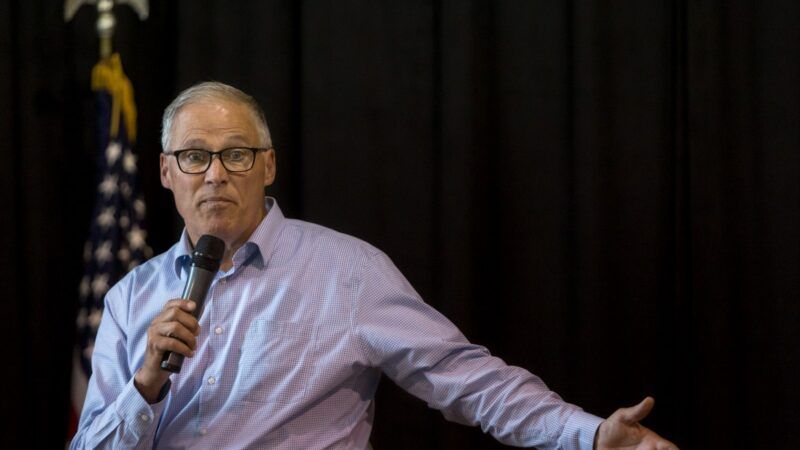Washington's Governor Wants To Prevent Another January 6 with Unconstitutional Censorship
Jay Inslee says we should make it a crime for politicians to lie about election results. What could go wrong?

Washington Gov. Jay Inslee wants to make it a misdemeanor for politicians to lie about election results. Yes, of course this would violate the First Amendment.
To justify the idea, Inslee is invoking the anniversary of the riot at the U.S. Capitol. "January 6 is a reminder not only of the insurrection that happened one year ago, but that there is an ongoing coup attempt by candidates and elected officials to overturn our democracy. They are willing to do this by provoking violence, and today I proposed we do something about that," he wrote last week.
He does not indicate what this has to do with elections in Washington state, all the way on the other side of the country, which is the only place where his law would apply.
In August, five Republican legislators in Inslee's state held a rally encouraging the conspiracy theory that the 2020 presidential election was fraudulent. They cannot be punished for such speech, because the First Amendment protects such arguments—yes, even false arguments.
Inslee thinks he can get around these protections by targeting falsehoods that are spread "for the purpose of undermining the election process" and "likely to incite or cause lawlessness." The wording of the bill is not publicly available yet, but the governor seems sure that it will fit within the limits of Brandenburg v. Ohio, the 1969 Supreme Court case establishing that speech inciting lawless action is not protected.
But that precedent requires the threat of lawless action to be "imminent." Eugene Volokh, a law professor at UCLA, notes that this is not a minor threshold.
"If I'm standing outside a police station and yelling 'burn it down,'" that counts as calling for imminent lawless action, Volokh explains. "But just saying an election is a fraud and we should do about it isn't incitement." And to the extent that speech can incite imminent violence, Washington already has a law criminalizing it.
Volokh also notes that courts have historically been reluctant to give officials the authority to punish certain types of false speech about the government itself. Some laws, like those that forbid lying about when and where elections take place, have passed muster. But trying to outlaw speech that questions the legitimacy of election results echoes the Sedition Act of 1798, which permitted the punishment of anybody publishing "false, scandalous, or malicious writing" about the United States. "This is part of the debate in the U.S. that is literally 225 years old," Volokh says.
The Sedition Act expired in 1801, but Inslee's arguments echo the arguments made for the act back then—the idea that if false speech undermines the government's credibility, it may foster violence against the government. Since then, many courts have recognized that such censorship can suppress legitimate allegations about government misconduct. The court precedents are not in Inslee's favor here, Volokh says. (Volokh has written more on the proposal here.)
There's a sharp irony to Inslee's efforts. A law that censors critiques of elections, even if these critiques are outright lies, would surely fan doubts about elections' legitimacy. By trying to suppress distrust in government, the law would foster it instead.
In case there are any questions about whether Inslee grasps the limits on the government's power to censor, he has defended his proposal by blithely invoking the "yelling 'fire' in a crowded theater" cliché. When a public figure deploys that quote from 1919's Schenck v. United States, it's virtually always a sign that he knows very little about the First Amendment's history. If you want to convince people that you'll censor in a restrained way, don't quote from a case authorizing the imprisonment of protesters who had been distributing anti-draft pamphlets.


Show Comments (127)